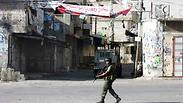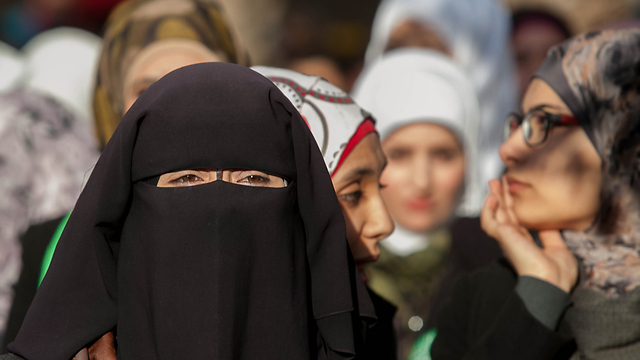
Nablus Kasbah. Most Israelis get a reminder of life beyond the Green Line from news reports only
צילום: איי אף פי
A parallel universe, just a one-hour drive from Tel Aviv
Op-ed: In a utopian reality, Israelis could have visited the West Bank as tourists, sat in Nablus' restaurants and cafés and received a massage at the Turkish bath for only 15 shekels.
From the "Nablus Skies" café-restaurant, the city below appears trapped between the mountains surrounding it, although its houses reached the slopes a long time ago. It’s a high observation post in northwestern Nablus, and the steep road climbing towards the city ends in a barrier at the entrance to a parking lot.

On one side, above the city, there is a promenade lined with restaurants and cafés, and on the other side there are amusement devices for children and picnic tables. During the summer nights and weekends, a line of cars as long as a snake jams the road leading here, and a thick cloud of hookahs and barbecues covers the area.
I toured Nablus a few weeks ago. I didn't go there to interview anyone or to cover an event. I just went with a friend, a journalist from Jaffa. An Israeli Arab who knows Nablus and knows where one should hang out.
We ate excellent kebab at a street stand in the city center (a plate packed with meat with grilled tomatoes and onions and a drink for 20 shekels). From there, we went to a Turkish bath in the Kasbah, which is located in a magnificent ancient building. We sweated in the sauna and then received a wonderful massage for only 15 shekels.

Palestinian women in Nablus. One cannot leave the city without a sense of frustration over the huge missed opportunity both sides are living in (Photo: Ohad Zwigenberg) (צילום: אוהד צויגנברג )
We arrived in the morning and left before sunset, with loads of tourists' experiences. Without any politics and without any talk about the conflict, less than a one-hour drive from Tel Aviv, a Palestinian city under full Palestinian control, a universe parallel to ours, which is closed to Israelis by law.
One cannot leave Nablus without a sense of frustration over the huge missed opportunity both sides are living in. We met Palestinians our age who have never been to the beach. When I returned to Tel Aviv and shared my experiences, many people told me they had never been there, and those who have did so as part of their military service.
We live side by side, and are separated by light years. The occupation, the resistance, the terror attacks, the mutual hostility, have set up mental, not just physical, barriers.
The frustration grows when you hear settlers saying that up until the Oslo Agreements, they used to visit Nablus for shopping and errands. Nablus' residents, on their part, worked in Israel, shopped and visited it. The two sides are clinging to the memories of those days, which are fading due to the time that has passed and the rivers of blood which have been shed in both places.
And so, we have repressed our neighbors. In the summer and during the holidays, we visited Europe and vacationed in the Greek islands. We even returned to Turkey. There was such a big flow abroad, that the computers at Ben-Gurion Airport collapsed.
In a utopian reality, we could have also toured the West Bank, sat in restaurants in Nablus, received a massage at the Turkish bath, and the Palestinians could have visited Israel and bathed in the sea not only during their holidays, when Israel lets some of them in on a one-time occasion.
Most Israelis get a reminder of the life beyond the Green Line from news reports only. Stabbing attacks at checkpoints, shooting attacks on the roads, a soldier's attempt to detain a little boy which is documented and distributed around the world.
We have lost the desire to know what is happening there on a daily basis, to know about the banal life's routine. We have no desire to visit their cities because of the fear and hatred. A visit there involves taking a real risk. On the other hand, the Palestinians visiting or working in Israel don’t feel completely safe either. The fear is mutual.
When evening falls, central Nablus is teeming with people. A human swarm fills the streets and the stores. There is not a single seat available at the kanafeh place in the Kasbah, and one portion costs five shekels. Not far from there, in the Rafidiya neighborhood, there are luxury restaurants with meat dishes for 120 shekels. The streets in the city center are clean, but above, in the Askar and Balata refugee camps, one cannot miss the dirt and neglect.
We left Nablus at 6 pm. At 7 pm, we were already back in Tel Aviv.










